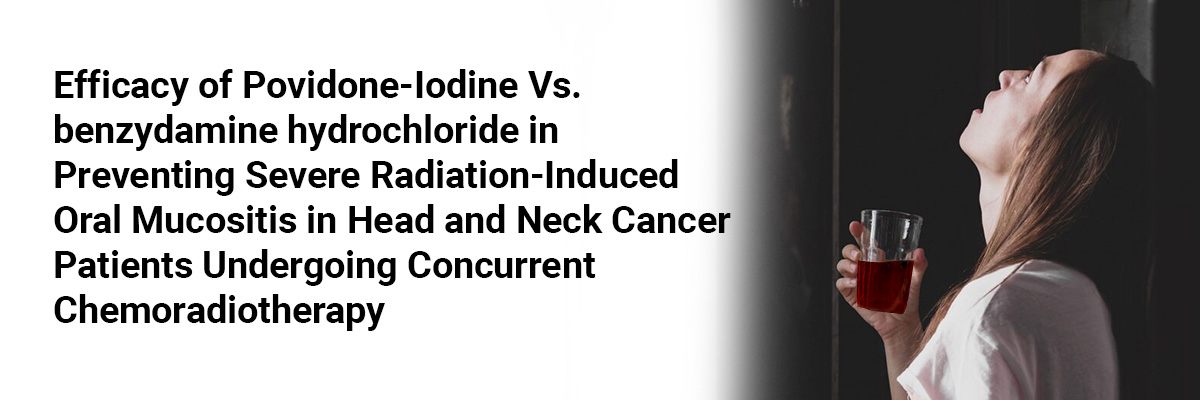

Efficacy of Povidone-Iodine Vs. benzydamine hydrochloride in Preventing Severe Radiation-Induced Oral Mucositis in Head and Neck Cancer Patients Undergoing Concurrent Chemoradiotherapy
Concurrent chemoradiation (CCRT) has traditionally served as the established treatment approach for preserving organ function or locally advanced head and neck cancer (LAHNC). However, one significant challenge associated with this treatment is radiation-induced oral mucositis (RIOM), which can limit the effectiveness of therapy. To mitigate the risk of RIOM, medical practitioners have recommended the use of benzydamine hydrochloride and povidone-iodine as preventive measures.
A recent study evaluated and compared the effectiveness of benzydamine hydrochloride and 0.1% povidone-iodine in preventing RIOM among patients with head and neck cancer undergoing concurrent chemoradiotherapy. The study looked for the occurrence of RIOM, assessed using the Oral Mucositis Assessment Scale (OMAS). Additionally, it also assessed RIOM using the NCI-CTCAE criteria, the use of analgesics, antibiotics, and anti-fungal medications, the need for hospitalization, and overall patient satisfaction with the treatment.
The study found-
• Study completion by 71 participants.
• Well-balanced demographic characteristics between both arms.
• Less RIOM with povidone-iodine than benzydamine hydrochloride.
• 51.4% incidence of grade III-IV CTCAE RIOM with benzydamine hydrochloride compared to 26.5% with 0.1% povidone-iodine.
• The peak incidence of grade III-IV CTCAE RIOM at the 7th week of treatment.
In conclusion, this study has demonstrated the effectiveness of povidone-iodine in preventing the onset of severe radiation-induced oral mucositis (RIOM), which typically reaches its peak severity during the final week of concurrent chemoradiotherapy (CCRT) treatment. Moreover, the study also highlighted two significant factors associated with the occurrence of RIOM, namely, the CCRT treatment setting (definitive vs. adjuvant) and the choice of gargling agents (povidone-iodine vs. benzydamine hydrochloride). These findings underscore the potential of povidone-iodine as a valuable preventive measure for RIOM in CCRT, especially in cases of definitive treatment settings.
Source: Kannarunimit D. A prospective randomized study comparing the efficacy between povidone-iodine gargling and benzydamine hydrochloride for mucositis prevention in head and neck cancer patients receiving concurrent chemoradiotherapy. Heliyon 9.2023. e15437
Related FAQs
The Topical Effect of Povidone-Iodine for the Repair of Oral Wounds
The Effectiveness of Low-Concentration Povidone-Iodine as Irrigant for Reducing Postoperative Complications after Third-molar Surgery
Effectiveness of Povidone-Iodine at various concentration as an Adjunct to Scaling and Root Planning in Managing Peri-Implant Mucositis
Evaluating the Antiviral Properties of Povidone-Iodine in Oral Healthcare
Comparative Evaluation of Betadine (Povidone-Iodine), Chlorhexidine (CHX), and Normal Saline in Tooth Extraction: A Study on Dry Socket Incidence and Infection Control
Practical use of povidone‐iodine antiseptic gargle in the prevention and treatment of common oropharyngeal infections
15 Seconds to Safety: PVP-I's Virucidal Efficacy
PVP-I Gargles: A Promising Antiseptic Shield against Whooping Cough
Povidone-iodine gargle prevents respiratory infections

